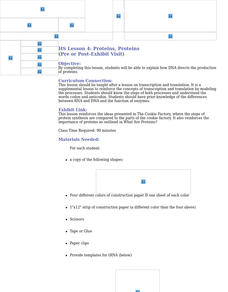Curated OER
The Physical Behavior of Matter
Students distinguish between three phases of matter: solid, liquid and gas, on the molecular level. They compare and predict the relative compressibility of the three phases of matter through journal writings and drawings.
Curated OER
Chemical Elements and Compounds Crossword
In this elements learning exercise, students complete a crossword puzzle by figuring out the vocabulary words associated with the 25 clues given.
Curated OER
Exothermic Rehydration of Gypsum
Learners observe exothermic reactions in the lab using plaster. In this chemistry lesson, students collect data from their experimental set up every five minutes. They explain the different stages in the hardening of plaster.
Curated OER
The Big Burp:A Bad Day in the Paleocene
Students describe the overall events that occurred during the Paleocene extinction event as well as the processes that are believed to result in global warming after group research. They infer how a global warming event could have...
Curated OER
The Big Burp: Where's the Proof.
Young scholars explore the Cambrian explosion and Paleocene extinction events. In this climate change lesson, students read articles to link evidence they find to extinction and climate change. Links to the articles are included in the...
Curated OER
Giants of the Protozoa
Students describe and define xenophyophores. In this protozoa lesson students divide into groups and complete a lab activity.
Curated OER
Genome: The Secret of How Life Works
Students explain how DNA directs the production of proteins.
Curated OER
Cooling With Sunshades
Students conduct research in order to find the effects of properties exposed to heat and how they change temperature. They consider the effect of sunlight upon objects that are placed outside with the help of an experiment. They also...
Curated OER
Is There Really Life on Mars?
Students examine the work of scientists and determine how they test their theories.
University Corporation for Atmospheric Research
Ucar: Just a Phase: Water as a Solid, Liquid, and Gas
This site helps students construct a model of the arrangement of water molecules when present as solid, liquid or gas. Includes background information, lesson plans, links to standards and assessment ideas.
PBS
Pbs Teachers: Bottle Fountain Experiment
Demonstrate how heating expands air molecules by constructing a bottle fountain powered by air pressure.












